Greetings from COVID Land.
I had dodged it pretty well, minus one mild case a couple of years ago, even though I was present at a few super-spreaders. One can only dance through raindrops for so long, I suppose.
The timing sucked. I had to bail on traveling for our board meeting and related social gathering in New York – left to be the dreaded (and dreadful looking) virtual participant, opposite a roomful of in-person onlookers. Fortunately, everyone was sympathetic. As I’ve said before, my board is lovely.
I’m on the mend, though not without some lingering brain fog. And it’s with that brain fog – perhaps because of it – that I’m making a shocking reversal on one of my biggest religious tenets.
We’re polling the election. Gasp!
If you’ve read this thing over the years, or seen me on television, or listened to me on a podcast, you know of my disdain for political polling. If you haven’t, look it up. Using survey data to predict election outcomes is irresponsible. Full stop.
But our clients kept asking for it. Which means our client team kept pestering me about it. Which means I had to think about it. And I did. A lot.
Most people gobble up political horserace polling because they hate the uncertainty. Knowing your gal or guy is going to win is comforting. Knowing they’re going to lose allows you to get ahead of the grieving process. It’s all an illusion. Nobody knows until the last vote is tallied.
We need to think about it differently.
Another thing you’ve heard me ramble on about is the growing correlation between political attitudes and consumer behavior in our country. Our economic views are heavily dependent on the confidence we have in political leaders to steer the economy. Our political views are, in turn, heavily influenced by the confidence we have in the economy. Layer in how the political winds influence our well-being…which influences our spending. It’s all intertwined.
So, our approach to political polling will be different. Our goal is to track and understand how the ups, downs, and news of the election are impacting consumers’ moods and behaviors. Yes, we’ll gauge how they plan to vote (among other things) – not to predict who wins – but to predict how those changing attitudes will play out in people’s spending, their media habits, and their lifestyle.
You can learn more about Election Consumer Mindset Tracker here. Again, it’s not free, but I’m sure I’ll share a few occasional things to whet your whistle.
And, if you insist on drawing conclusions from the candidate preference data, we can’t stop you…sigh.
Here’s what we’re seeing:
America’s collective mood is in the shitter. Our Emotional Well-Being Index hit its lowest point in 16 months last week, as the effects of the Israel-Hamas war weighed on our psyche. It punctuated a run of four straight monthly declines, previously driven by weakening financial optimism. A longer-term look at the index shows just how much Americans are affected by global unrest (although this one is hitting harder at home), as the biggest drop happened when Russia invaded Ukraine. The malaise hit nearly every group, across age, race, and party lines – except one – Gen Z.
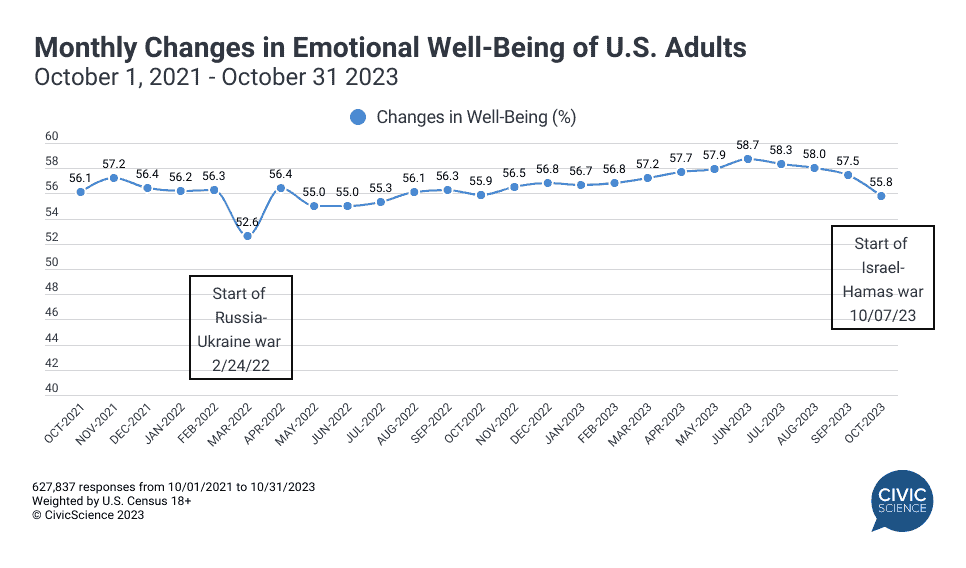
That’s not to say Gen Zs are the happiest bunch. When the emotional well-being of an age group is already in the dumps, we shouldn’t do cartwheels when it doesn’t fall any further. Our youngest adults are also our saddest – and loneliness is a big reason why. Over half of Zs say they’re feeling somewhat or very lonely right now. Meanwhile, across all adults 18-44 who use dating apps, 49% say they’re using online dating apps more than they did before COVID. No coincidence, Americans are also much more likely to say they’re participating in fewer social activities. It seems social distancing never fully went away.
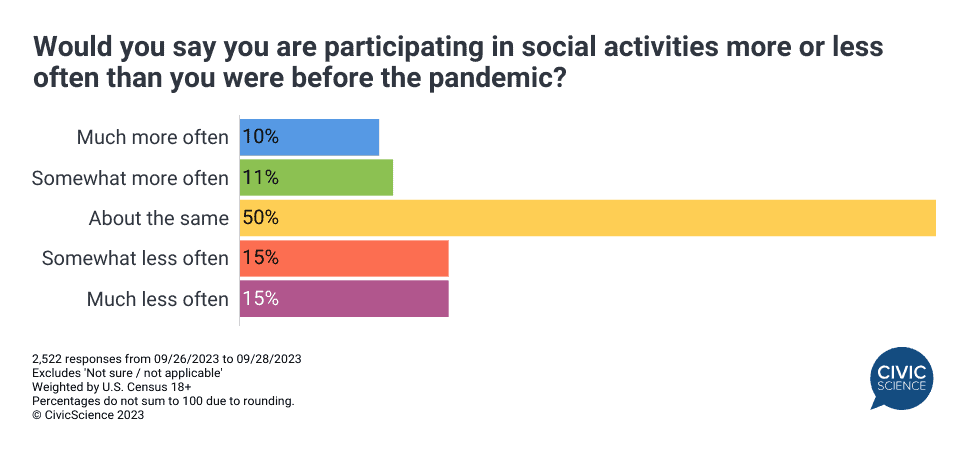
You should think about letting people bring their dogs to your retail store. In our 3 Things to Know this week, we asked people whether they’d be more likely to shop in-store at a dog-friendly retailer (indeed, they would be). We also dug a little deeper into the people who say they’re planning to spend more this holiday retail season – a lot of them say they plan to purchase fewer gifts, just expecting a bigger price tag. And a smaller group plans to use Buy Now, Pay Later services more than they did last year. See: interest rates.
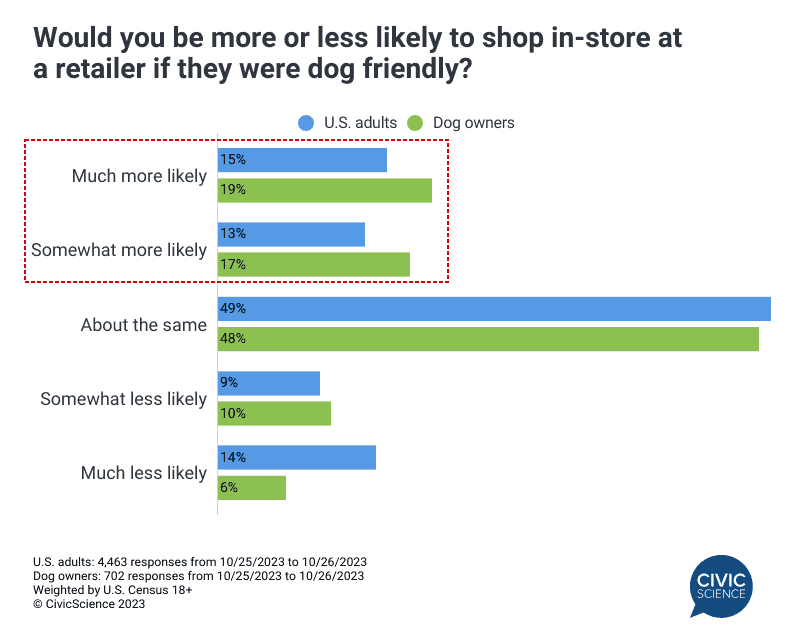
Social media platforms have done a decent job cleaning up their image over the past couple years, except Twitter. I’ve celebrated the purge of political content on Facebook a few times in this little email and I’m not the only one who’s noticed. While trust in traditional news sources continues to wane, trust in the big social platforms to protect young users has climbed – in some cases significantly – since 2021. It’s worth noting, however, that concerns over the impact of these platforms on teen mental health and safety are still a big problem.
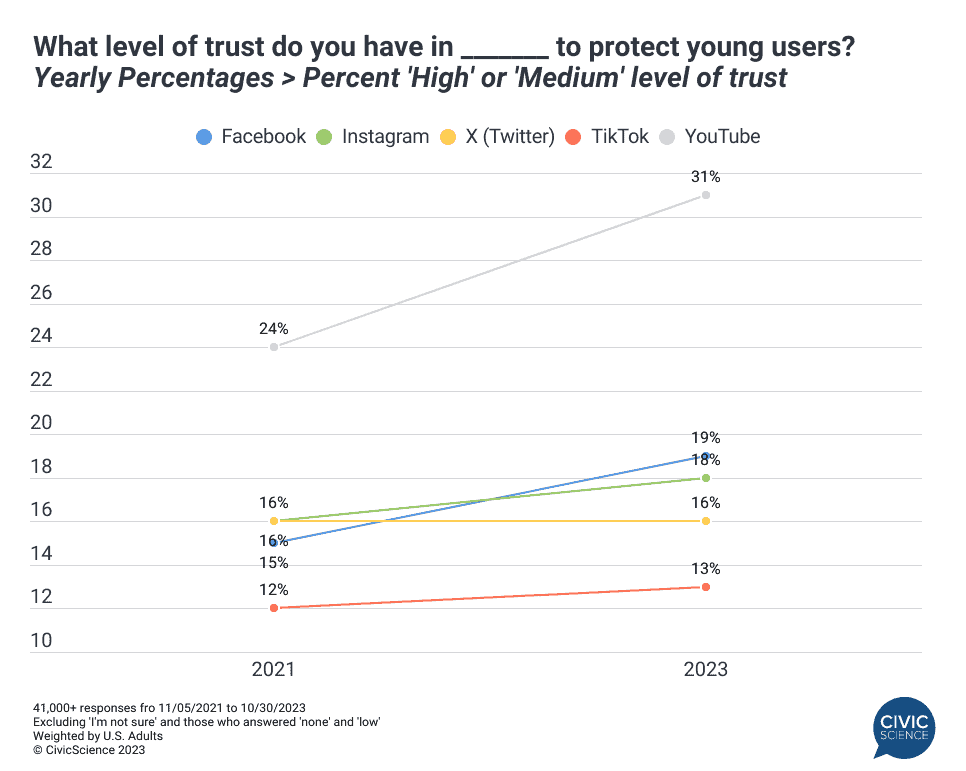
Liquid Death reminds me how much marketing has changed in our fragmented world. I had my first Liquid Death drink a month ago (I loved it), after walking past the cans in C-store coolers a thousand times. The name rubbed me the wrong way, like Monster Energy Drinks or Black Rifle Coffee – call me a pacifist, I guess. But clearly, I’m not the target market, because Liquid Death is all the rage with Gen Zs and Millennials. Over half of consumers who’ve heard of the brand say they’ve tried it or want to, which is a crazy ratio. It means Liquid Death has been incredibly precise in reaching – and winning – their target market.
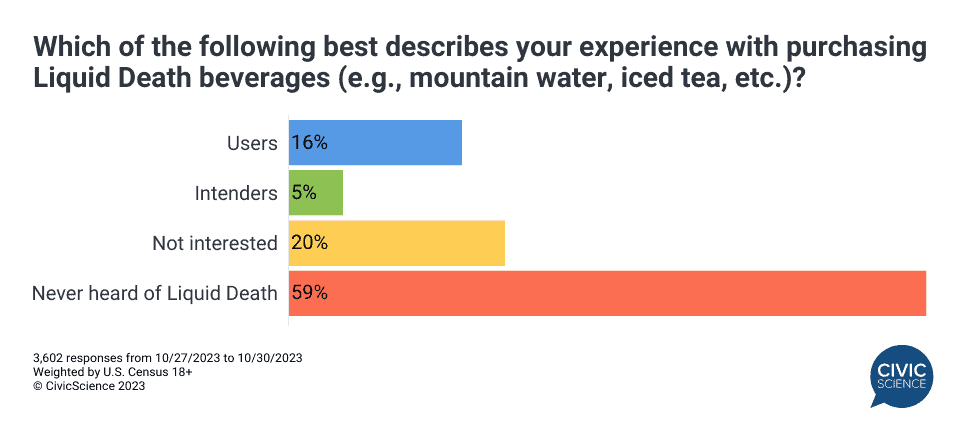
More awesomeness from the InsightStore™:
- Online-only banks are gaining favor among Gen Z;
- 18% of Facebook and Instagram users say they’d be willing to pay for an ads-free subscription;
- Horror movie fans are much more likely to use mindful meditation apps, which maybe they wouldn’t need if they didn’t watch horror movies;
- To spotlight our new branded What We’re Seeing product, we’re highlighting some of the latest trends through the lens of different brand consumers each week. This week, we looked at 3 Things to Know about Sephora and Jimmy John’s customers.
The most popular questions this week:
Do you tend to eat spicy foods often?
Would you ever consider living in a tiny home?
Do you typically eat breakfast cereal for breakfast?
How do you feel about the Las Vegas Sphere?
Would you consider moving to another country?
Answer Key: Almost exclusively; No way…claustrophobic; Never, ever; Can’t wait to go; Still considering it.
Hoping you’re well.
JD
Want to see weekly insights from the What We’re Seeing through the lens of your customers? Learn how here.
Was this email forwarded to you? Sign up here. If you are new to this list, check out our Top Ten to get caught up.








